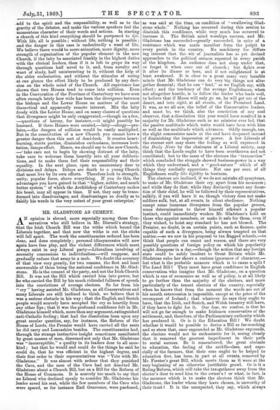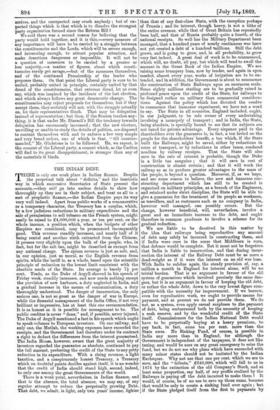MR. GLADSTONE AS CEMENT.
AN opinion is abroad, more especially among those Con- servatives who still believe in Mr. Disraeli's strategy, that the Irish Church Bill was the withe which bound the liberals together, and that now the withe is cut the sticks will fall apart. The work the constituencies ordered has been -done, and done completely ; personal idiosyncrasies will now again have free play, and the violent differences which must -always exist in any Liberal party—Liberalism involving of _necessity concessions to individualism—will reappear, and gradually reduce that army to a mob. We doubt the accuracy of that view very greatly, for two reasons, the first and least .answerable of them being the national confidence in Mr. Glad- stone. He is the cement of the party, and not the Irish Church Bill. It was not the Bill which carried him into power, but dm who carried the Bill by his much ridiculed fullness of speech into the convictions of average electors. So far from his " cry " having assisted Mr. Gladstone, as all Conservatives and _many Liberals are still inclined to think, we believe that it was a serious obstacle in his way ; that the English and Scotch people would scarcely have accepted the cry so heartily from any other lips ; that it was the profound confidence felt in Mr. Gladstone himself which, more than any argument, extinguished anti-Catholic feeling ; that had the dissolution been upon any great secular question, say, for instance, the Reform of the Souse of Lords, the Premier would have carried all the seats he did carry and Lancashire besides. The constituencies had, through the strange instinctive insight sometimes manifested -by great masses of men, discerned not only that Mr. Gladstone was " incorruptible," a quality in its leaders dear to all man- kind ; but that he would and could do the things he said he could do, that he was efficient in the highest degree, and -their first order to their representatives was " Vote with Mr. :Gladstone." It was almost with ardour that they punished the Cave, and the men of the Cave had not deserted Mr. Gladstone about a Church Bill, but on a Bill for the Reform of the House of Commons. It is scarcely too much to say that no Liberal who declined openly to consider Mr. Gladstone his leader saved his seat, while the few members of the Cave who were spared, as for instance Earl Grosvenor, were pardoned, as was said at the time, on condition of " swallowing Glad- stone whole." Nothing has occurred during this session to diminish this confidence, while very much has occurred to increase it. The British mind worships success, and Mr. Gladstone has succeeded—greatly succeeded, in spite of a resistance which was made manifest from the pulpit to every parish in the country. No machinery for diffus- ing interest that the wit of journalists has as yet devised approaches to the political sermon repeated in every parish of the kingdom. An audience does not sleep under that, or forget it when once out of church ; but fights over it after its dinner or beer, and if not enlightened is at least awakened. It is clear to a great many very humble minds that Mr. Gladstone can do very big things not alto- gether financial; that he can " lead," as we English say, with effect ; and the tendency of the average Englishman, when not altogether hostile, is to follow the leader who leads well, to believe that if Moses will only go on, he will get out of the desert, and into sight, at all events, of the Promised Land. It was, as we all saw, the belief of the Conservative leaders, and must be, we think, also the conviction of any cool observer, that a dissolution this year would have resulted in a majority for Mr. Gladstone such as no minister ever led, that the passive multitude which waits would have been with him as well as the multitude which advances. Oddly enough, too, the slight concessions made at the end have deepened instead of diminishing the impression of power. A few Liberals of the sterner sort may share the feeling so well expressed in the Daily News by the chairman of a Liberal society, may think that the Lords ought to have been overthrown and not conciliated; but to the mass of the electors the "transaction" which concluded the struggle showed business-power in a way which they understand, and a " good-nature " which of all things they cordially appreciate. Not one per cent. of all Englishmen really like rigidity in business.
The electors are inclined, if we do not mistake all symptoms, to make of Mr. Gladstone their cry, apart from his measures ; and while they do that, while they distinctly resent any deser- tion of their chief, he will be followed by their representatives, sulkily, if you will have it so, though victory does not make soldiers sulk, but, at all events, in silent obedience. Nothing except some immense divergence from the popular groove, some determination to throw himself athwart a popular instinct, could immediately weaken Mr. Gladstone's hold on those who appoint members, or make it safe for them, even if they wished, to hoist any standard he has not blessed. The
Premier, no doubt, is on certain points, such as finance, quite capable of such a divergence, being always tempted on that matter,—as we saw in his proposal to tax Ragged schools,—to think that people can count and reason, and there are very possibly questions of foreign policy on which his popularity might disappear in a day,—though the notion that any foreign state could be safely insolent to Great Britain while Mr. Gladstone rules her shows a curious ignorance of character,— but what is the probable measure which is to cause a split I The Land Bill They must have great confidence in English conservatism who imagine that Mr. Gladstone, on a question which is one of economics as well as of policy, is at all likely to go farther than the majority of the electors, and more particularly of the tenant electors of the country, especially when he knows that from the moment the words are out of his mouth retrocession is impossible, except at the price of the reconquest of Ireland ; that whatever he says they ought to have, that the Irish, and Scotch, and Welsh tenantry will have, if they have to fight for it. Our fear, we confess, is that he will not go far enough to make Irishmen conservative of the settlement, and, therefore, of the Parliamentary authority which has produced it. Or is it the Education Bill ? We doubt whether it would be possible to devise a Bill so far-reaching and so stern that, once expounded as Mr. Gladstone expounds, the electors would not be enthusiastic for it, seeing clearly that it removed the greatest impediment in their path to social success. Be it remembered, the great obstacle to education, the feeling of the middle-class, and espe- cially of the farmers, that their sons ought to be helped to education first, has been, in part at all events, removed by Mr. Forster's great Bill, which meets them as it were at the very beginning of an otherwise justifiable growl. Or is it a Rating Reform, which will take the tax-gatherer away from the elector's door to send him to the owner's I or what, in fact, is the measure which is to make the electors think that Mr. Gladstone, the leader whom they have chosen, is unworthy of their trust I It is the unexpected, they say, which always arrives, and the unexpected may crush anybody ; but of ex- pected things whioh is that which is to dissolve the strongest party organization formed since the Reform Bill ? We said there was a second reason for believing that the party would hold together, and it is this,—every measure of any importance will have to be carried by a struggle between the constituencies and the Lords, which will be severe enough, and interesting enough, to attract popular attention, and make desertions dangerous or impossible. It will not be a question of measures to be carried by a greater or less majority,—a matter of figures, about which consti- tuencies rarely get savage,—but of the measures themselves, and of the continued Premiership of the leader who proposes them. On that point the Liberal party is sure to be united, probably united in principle, certainly united by that dread of the constituencies, that extreme dread, let us even say, which was inspired by the incidents of the last election, and which always follows any great democratic change. The constituencies may reject proposals for themselves, but if they accept them, they certainly will not, with the struggle actually on, let their representatives flinch. That may be delegation instead of representation ; but then, if the Session teaches any- thing, it is that under Mr. Disraeli's Bill the tendency towards delegation has enormously increased ; that the new electors, unwilling or unable to study the details of politics, are disposed to content themselves with and to enforce a few very simple and very broad orders, one of which is that, " till counter- manded," Mr. Gladstone is to be followed. He, we repeat, is the cement of the Liberal party, a cement which, as the Carlton will find to its great disappointment, is stronger than any of the materials it binds.































 Previous page
Previous page